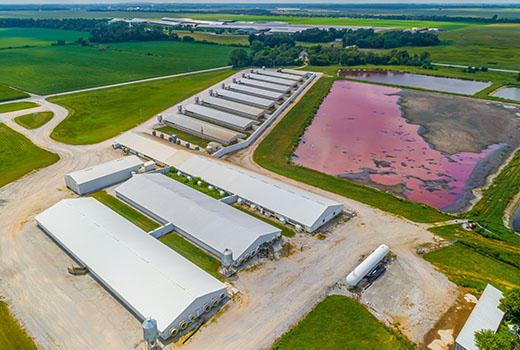
September 12, 2022Media ReleaseNew Study Shows How U.S. Farm Laws Advance Environmental Injustices in Rural Areas and How Corporate Agribusinesses are Reaping the Greatest Benefits
For immediate release, 12 September 2022
Cambridge, MA – September, 2022. We have totally failed at regulating pollution from big-ag says a new study that explains agricultural exceptionalism and its impact on people and our environment. In a first-of-its-kind study across all 50 states, Danielle Diamond, an attorney and Visiting Fellow with the Brooks McCormick Jr. Animal Law & Policy Program at Harvard Law School lays out why the laws we think will protect people and the planet are in fact favoring one of the biggest polluters. The study, published in The Environmental Reporter, shares groundbreaking research by an interdisciplinary team of lawyers and social scientists on U.S. right-to-farm laws.
“Until now, the widespread consequences of right-to-farm laws have not been quantified,” says Diamond. “Consumers, farmers, activists, scholars, lawyers, judges, lawmakers, and government leaders all need to realize the true implications of these laws, especially given their far-reaching implications for rural people, public health, natural resources, our food system, and global climate change.”
“Time and again big agribusinesses get a free pass to pollute and cause harm to people and our planet. This kind of agricultural exceptionalism must end,” adds Diamond whose deep dive study covers all 50 states’ laws. The researchers analyzed all original right-to-farm statutes (most dating from the 1970s and 80s), each state’s current law, as well as any amendments and litigation outcomes that have occurred over time. In addition to in-depth investigations of each state, the researchers also used NVivo software to identify and quantify patterns crossing state lines. The results show how right-to-farm laws have taken away nuisance and other protections, effectively sanctioning environmental injustices in rural areas. Business entities, such as corporations, and large-scale industrial livestock facilities, which are often referred to as concentrated animal feeding operations (CAFOs), are found to be the most common parties using these laws.
Co-author, Dr. Loka Ashwood, a Sociologist from the University of Kentucky, states that “CAFOs and business entities disproportionately win using right-to-farm laws. Sole proprietor farmers and rural people who live in the countryside benefit the least from these laws.”
The study reveals how “agriculture” has been utilized by the largest of agribusinesses as a rhetorical tool to avoid democratic accountability. According to Diamond, “the public is becoming increasingly aware and intolerant of the inhumane treatment of livestock by industrial agribusinesses. There needs to be more awareness of the legal apparatuses that provide cover for such harmful industry practices.” “It’s nonsensical to give unfair advantages to large industrial agriculture polluters causing environmental injustices.”
The authors propose a simple, yet plausible solution: rescind right-to-farm laws and allow common law to evolve. This would allow courts to base their decisions on notions of fairness and equity, as opposed to abiding by strict statutory mandates exempting polluters and preventing small independent farmers and others from seeking recourse.
The study is available through The Environmental Law Reporter and as a PDF with ELR’s permission. State-specific right-to-farm law summaries for all 50 U.S. states can be found on the One Rural website. A book that provides a more detailed analysis of right-to-farm laws is expected to be published late next year.
To interview the authors, contact ALPP’s Communications Director Sarah Pickering: [email protected], 617 852 6484.
